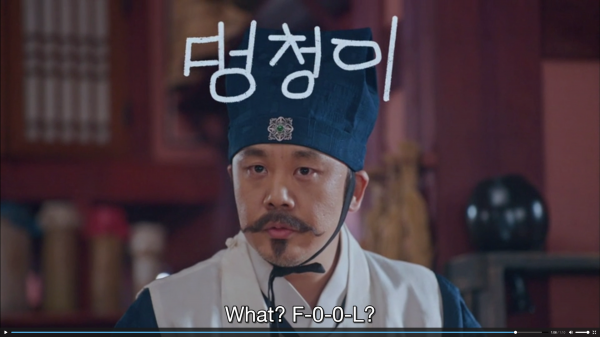The Bingo Spaces, Explained
Modern K-Drama Set
These sets represent a collection of tropes common to a particular genre of media.
(Dis)possession (2 pts)

Ghosts, spirits inhabiting bodies, or body- or identity-swapping
The spirit possession in The Uncanny Counters, O My Ghost!, or the gender- and body- (and time-!) swapping of Mr. Queen.
Childhood friends forgotten (2 pts)
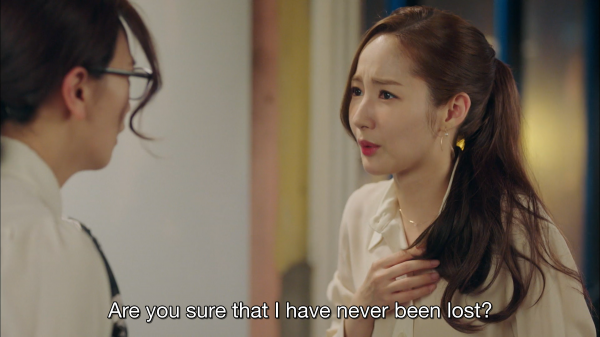
Characters knew, or at least encountered, each other in childhood, but somehow forgot
This is, surprisingly, one of the slowest tropes to play out, often going unexplained until a dozen episodes into the series. A shining example is the joint childhood abduction in What's Wrong with Secretary Kim?, but often the relationship is incidental, like one character being the young child of the funeral director when another young character's parent died decades ago.
Vehicular tragedy (2 pts)

Someone is/was hit by a car, truck, bus, or motorcycle
An unusually common plot point. Sometimes it's the start of the show, Ghost Doctor, and sometimes it's a past tragedy that still weighs on the present.
Bullying (1 pt)

Be Best, Korea
In Crazy Love, Noh Go-Jin is bullied as a child because he ate onions all the time. All of Us Are Dead includes scenes of sexually predatory bullying.
Cartoony FX (1 pt)

Animal or cartoon visual and sound effects to reinforce behavior or mood
A cat meow to match a glaring scowl, a wimpering dog to accentuate with a cowering submissive, or the thunder of a storm of increasing disapproval. The most extreme version of this occurs in Yumi's Cells (유미의 세포들), when Woong literally turns into a bear.
Cramped quarters (1 pt)
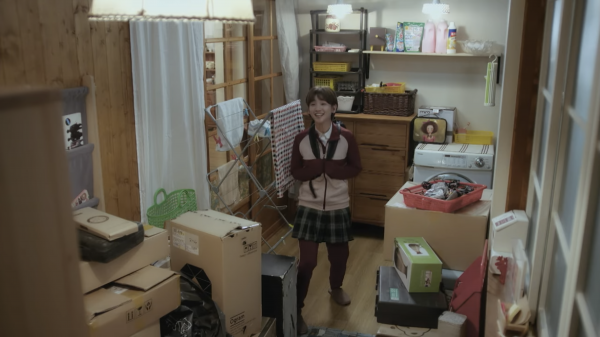
Sleeping in a repurposed closet, or on a balcony, or in insane tiny student housing
Son Na-Eun in Cinderella and the Four Knights sleeps out on the balcony.
Crushing Debt (1 pt)

Characters are motivated by their debt (or a family member's), including the threat of foreclosure
School 2020 featured a character whose grandfather was losing his home. Let Me Be Your Knight depicts a woman who finds herself suddenly homeless after being scammed out of tens of thousands to buy her childhood home.
Finger hearts (1 pt)
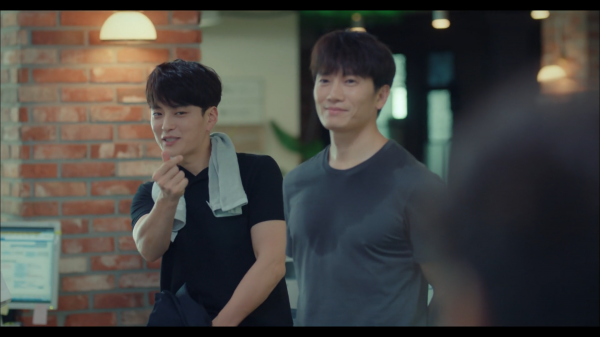
Any use of finger hearts by a character
Too many to count. This is an easy point, but also should be a staple of any good K-drama.
Korean Standoff (1 pt)
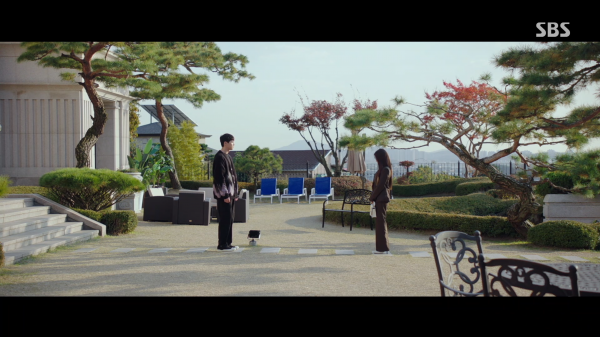
Two principal characters have a serious, sometimes emotionally confrontational, conversation while standing at least 1m apart
Characters must remain rigidly vertical during the entire conversation, and points are only granted for emotionally charged conversations (resignations, break-ups,declarations of love). This is usually an easy point.
Memorial service (1 pt)
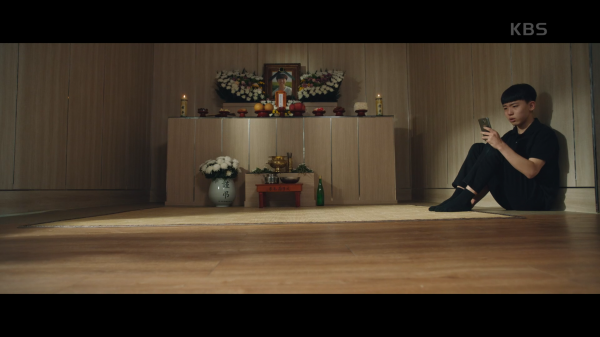
Funerals and memorial services
Often a significant plot point, from the early tragic childhood memory of losing a parent, or a character who can no longer afford to pay for her mother's ashes to remain on display.
Middle-of-the-Road Soliliquy (1 pt)

Verbal musings on deep existential questions and/or tragicomic situations while in the middle of the street
Must be spoken out loud. Also works on dirt roads and village paths in Joseun period dramas!
Piggyback (1 pt)

Someone gives someone else a piggyback ride
Virtually always the result of over-drinking (and, I suppose, the hills of Seoul). I cannot even tell you the last time I saw a piggyback ride given on American television; this is classic Korean.
Pinky swear (1 pt)

Two characters doing a pinky swear
Touching thumbs at the end is not a thing in America (based on my terrible polling), so that gets an easy bonus point for any wannabe K-drama.
What's Wrong With Secretary Kim? has a scene with the two cutest kids on the planet, doing a great pinky swear silhouetted by the sun.
Rumble tummy (1 pt)

Audible stomach rumbling to indicate hunger
Too many to count. The noisy gurgle of a stomach virtually always means that the character is hungry, but it almost always happens just after the character lies about not being hungry.
Shamans & Talismans (1 pt)

Yellow paper talismans, written in calligraphic red ink; visits to a shaman for fortune-telling or body transfers
Used in period pieces, fantasies, as well as modern-day rom-com K-dramas. Jirisan used them to ward off evil mountain spirits. Other shows have them tucked away in purses for protection, or sometimes they are simply the money-making con of a fake shaman selling solutions. Superstitious use of names written in red ink may also apply here by extension.
Son Hyeung Min (1 pt)

Mentions of Son Hyeung Min, or staying up to watch Tottenham Hotspur play
School 2020 had a character obsessed with Son Hyeung Min. Because of the time difference, EPL matches often feature in late-night or "cannot sleep" scenes.
The Playground (1 pt)

Any scene taking place in a neighborhood playground
Perhaps it has to do with the design of neighborhoods in Seoul, but every good K-drama ends up with one or more scenes on a playground, usually a swingset or see-saw. At night, when there are no children around.
Thumbs up (1 pt)

Two thumbs up for "Good job!"
Another easy point, except for period pieces. Happens occasionally in American sitcoms, but another staple of K-drama culture. Good luck!
Wrist grab (1 pt)

Dramatically grabbing someone by the wrist as they walk away
Another staple of the romantic drama. The halting acts of retention ("Don't go!") combines with the lascivious physical contact. The music swells, and your heart stops. Or your eyes roll.
강한나 (Kang Han-Na) (1 pt)
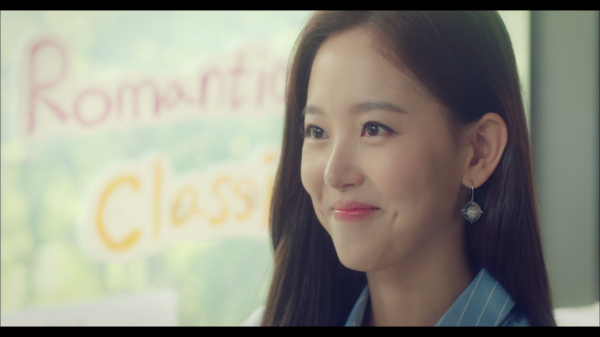
The presence of Kang Han-Na makes everything at least 1 point better
Accidental Wife, My Roommate is a Gumiho, Bite Sisters, Bloody Heart


